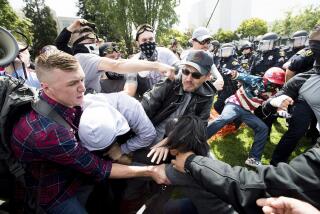State Court Upholds Firing of Gay Scout Leader
- Share via
SAN DIEGO — A state appellate court ruled Thursday that the Boy Scouts of America had the right to fire a police officer as a Boy Scout leader because he is gay.
Superior Court Judge Anthony Joseph had ruled in 1994 that the Boy Scouts violated the rights of El Cajon Police Officer Chuck Merino when it fired him as a volunteer leader of an Explorers post. Merino is seeking reinstatement.
Merino, 41, a police officer for 19 years, had been the leader for four years and earned praise from Scout leaders and Scouts alike. He was fired in 1992 after he told a community meeting discussing gay-bashing in his neighborhood that he was gay.
Merino said he will appeal Thursday’s ruling to the California Supreme Court.
“I started something and I think it is important to see it through,” Merino said. “The Boy Scouts need to learn to judge people as individuals, not put everyone in a group and make judgments about them. For them to say I lack family values is ludicrous.”
Darrell Watkins, assistant Scout executive for the Desert-Pacific Council, which governs the Boy Scouts in San Diego and Imperial counties, said he is glad the appeals court “has affirmed our right to establish and maintain leadership standards and to ensure that our leaders serve as role models for the values of Boy Scouts.”
The firing of Merino polarized San Diego County as gay leaders demanded that San Diego kick the Boy Scouts out of their quarters in city-owned Balboa Park and Fiesta Island, and the El Cajon and San Diego police severed ties with the Boy Scouts. But the Sheriff’s Department expressed solidarity with the Scouts and some political and civic leaders rallied behind the organization.
On Thursday, a three-judge panel of the 4th District Court of Appeal ruled unanimously that the Boy Scouts are not a business organization and therefore do not fall under the state law and local ordinance banning discrimination against gays.
Justice Richard Huffman, in a concurring opinion, went even further, saying that because the Boy Scouts have expressed a belief that homosexuals are not proper role models, forcing the group to retain a gay leader would violate the group’s 1st Amendment right to freedom of association.
Huffman wrote, “The message [the Boy Scouts] seek to convey to its membership does not include approval of homosexual conduct by a person who is acting as an appropriate role model and moral example. Moreover, some of the religious entities with which [Boy Scouts] is affiliated strongly disapprove of homosexual conduct.”
In 1994, an appellate court in Los Angeles issued a similar ruling in a case of a gay man refused a Boy Scout post in Berkeley; that ruling is to be considered by the California Supreme Court. Once the state high court makes a decision, it will apply to all such cases, including the Merino case.
Judge Joseph’s decision in the Merino case had been hailed by gay and lesbian leaders because it marked the first time a court had ruled that the Boy Scouts could not discriminate on the basis of sexual orientation. In the Berkeley case now before the Supreme Court, the trial court had found in favor of the Boy Scouts.
In court, lawyers for the local Boy Scouts argued that the Scouts’ national charter opposes homosexuality and states that the group does not knowingly employ gays or lesbians. To fund the legal fight, the Scouts sent letters to parents of Scouts expressing the importance of the case.
Merino said his lawsuit has helped alert the public “about these outdated and homophobic policies of the Boy Scouts.”
Watkins said the lawsuit has unfairly drawn attention away “from the reasons the Boy Scouts exist: to promote citizenship training, character development and personal fitness.”
More to Read
Sign up for Essential California
The most important California stories and recommendations in your inbox every morning.
You may occasionally receive promotional content from the Los Angeles Times.










